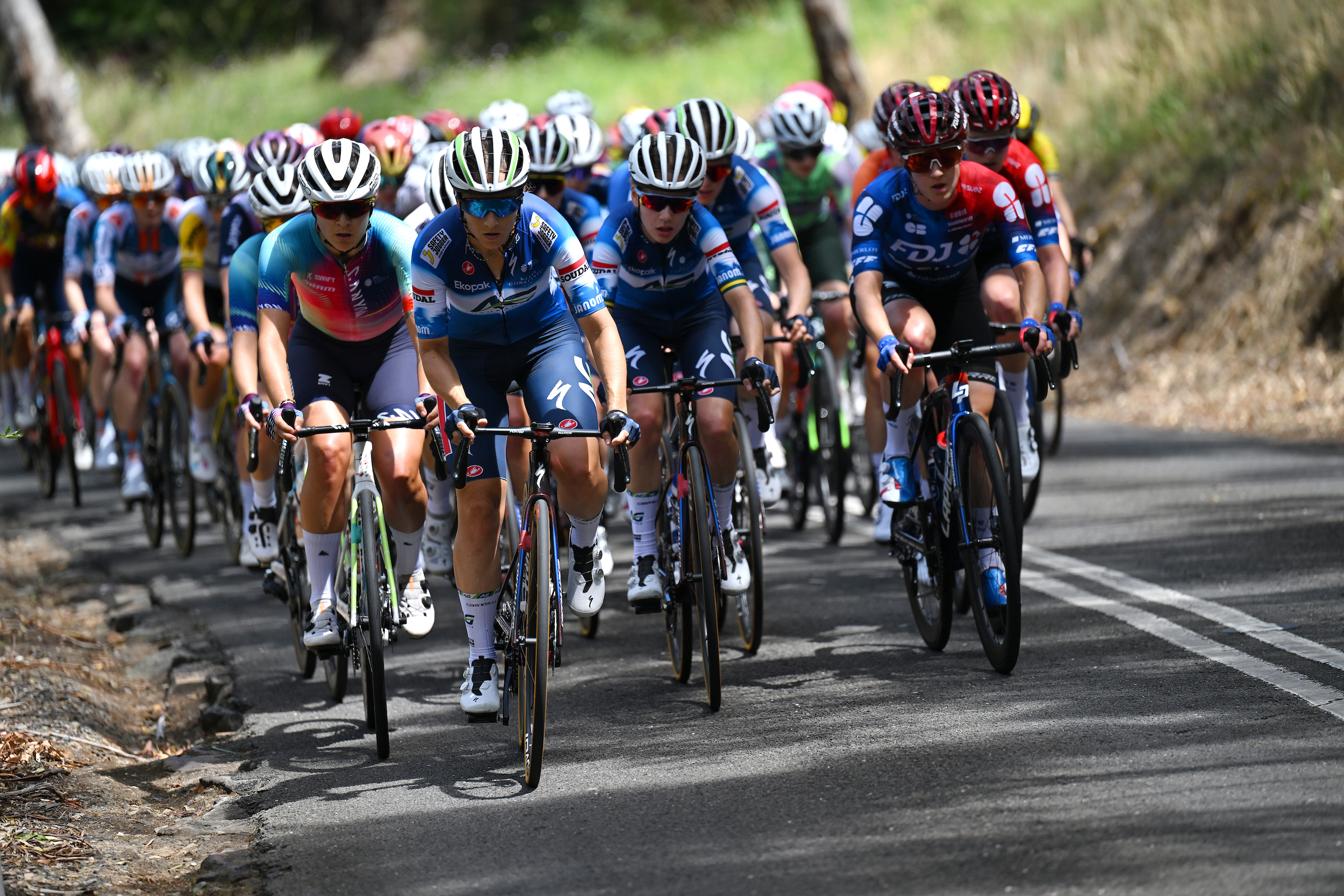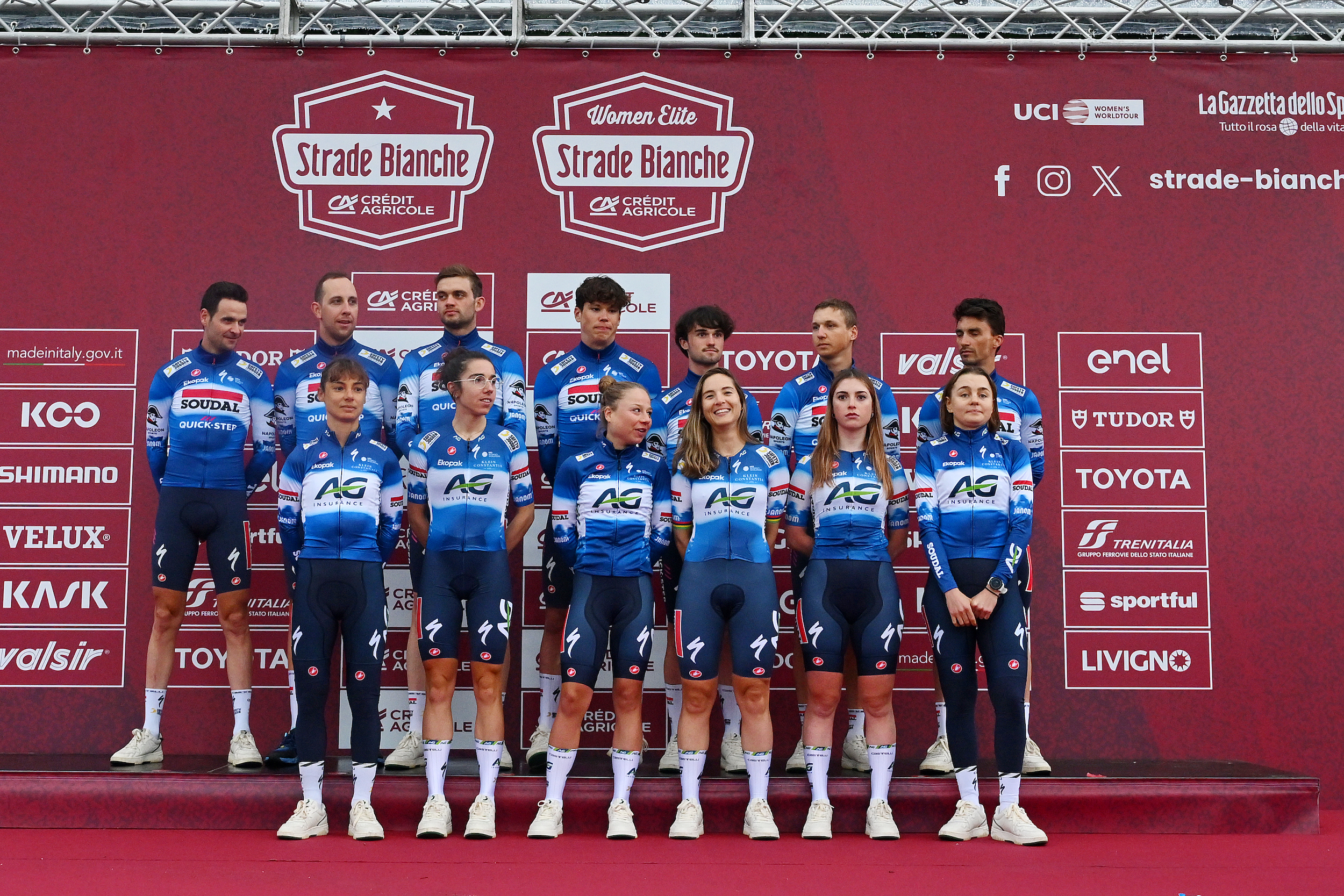

{kiosq_button:center}
How likely is it that a cyclist from an island in the Indian Ocean three-quarters the size of Luxembourg, who raced just five times on the road last year, would become one of the breakthrough stars of the 2024 season so far?
This time last year, Kim Le Court was living in South Africa, racing her mountain bike. Her long-time dreams of a professional road career were a spec of dust in the distance, just a hope that passed her by years ago.
Twelve months later, the Mauritian, who now races for AG Insurance-Soudal, has been one of the revelations of the 2024 Women's WorldTour season and looks nothing like a rider who has just switched to a new sport.
The 28-year-old started her season in Australia, placing ninth in the Cadel Evans Great Ocean Road Race after playing a key support role in teammate Sarah Gigante’s win at the Tour Down Under. Le Court had more success during the Spring Classics, with ninth again at Classic Brugge-De Panne, tenth at Paris-Roubaix and a string of other strong results.

“I think I've completely overachieved [on] what I expected,” Le Court told Cyclingnews during a short break back home in South Africa after the Classics.
“I am someone that doesn't really believe in my capabilities and myself quite a lot. It might not show, but I'm really someone that's very shy and insecure. I think the support I have around me did motivate me and kind of gave me that extra mental state where I knew I could do something special, but I just didn't know how special, how big.”
Le Court may describe herself as insecure, but that doesn’t seem to dampen her doggedness, which she says comes from the fact that she has come a long way to get to this point. She thinks that the journey she has had to make gives her a competitive advantage out on the road.
“Coming from so far and coming from a country with very, very little opportunities has put me in a different headspace than I think most girls in that bunch.
“So I think I want it a lot more maybe …I'm just saying that because that's how I feel,” she says with a pause, qualifying her point.
She continues: “I just feel like I'm coming here with a lot more to lose than other girls that kind of are there, and they can just go home. I'm not close to home. If I want to just go see my husband or my parents, they're not just a short-hour flight away. I can't do that. I'm sacrificing a lot for this, so I'm putting really 180% into this.”
‘Roubaix was horrible…I absolutely loved Roubaix’
Le Court’s spring success becomes even more impressive when considering an injury she sustained to her wrist after a crash in Gent-Wevelgem. Le Court went down hard on her way to 13th and the injury would cause her to race in pain for the rest of the spring, something that was particularly challenging in the finale on the cobbles, Paris-Roubaix.
“Roubaix was horrible. The first 40k’s, which was on tar, I literally was in tears on the radio. I was in the back of the bunch most of that time just because I just could not handle the braking and standing up and reacting – it just was super painful,” she recalled.
“On the radio, I was like ‘Servais [Knaven, DS], I can't do this, I really can't do this, I don't know what to do’. Then we got to the third cobbled section, and my hand slipped off the bar because I couldn't hold on tight enough with the pain, and I almost went over my bars.
“And then all of a sudden we got into the more difficult sections and somehow, I don't know, my legs felt really good, it was just a matter of dealing with the pain. And I ended up in the front group and I was like ‘oh well, okay, I'm here now, I'm going to just try my best to deal with this pain’.
Le Court ended the day in 10th place after missing the decisive final move through some bad positioning. Despite the soreness in her wrist, it’s a race that she revelled in and where her years on the mountain bike served her well.
“The cobbles make it difficult and the girls struggle on it, but I absolutely loved Roubaix,” she said.
“I think also like Strade [Bianche], I could see in the downhills I was a bit more comfortable on the gravel,” Le Court added.
Last year’s Cape Epic winner – a race she won in a pair with Namibia’s Vera Looser – doesn’t intend to return to the knobbly tyres any time soon. The road has always been her ultimate dream. Le Court even intends to forgo a place on the mountain bike in this year’s Paris Olympics, but will compete in the road race as she puts her full focus on her job with AG Insurance-Soudal.
A second chance

Although Le Court has become the first rider from Mauritius to race for a WorldTour team this season, this is not her first time racing at the UCI level in Europe.
She raced for Matrix Fitness and Bizkaia-Durango in 2015 and 2016, respectively, but experienced a very different sport in those years, one which made it difficult for women to financially sustain themselves, ultimately meaning Le Court had to return home.
“When I came back to South Africa I almost stopped cycling completely just because it was a lot to handle. They say that people from far away that come to Europe, you either make it or you don't," she said.
“But now the scene is so much better; you do get financial help so you can live comfortably and in a good space and not stress about stuff you shouldn't be stressing about when you're doing this for a living, and you want to get to the highest level possible.”
It’s a challenge faced by many riders who grow up away from cycling’s European epicentre. Le Court hopes that her success can inspire others in similar positions.
“I hope it motivates more people from the southern hemisphere that it's possible and you can make it and you should make it to compete against those big countries,” she said.
Le Court wears the Mauritius colours proudly on the bottom of her sleeves as a former national champion, even if they are regularly confused with the similarly coloured rainbow bands of a previous world champion.
She intends to return home to the Indian Ocean island in June for the national championships with the aim of representing her country in Europe with a full national champion’s kit.
“That's important to me, to come back to Europe with the flags," she said.
“It's a super, super small country. Even today, I meet people, and they're like, ‘Oh, where's Mauritius?’ No one really knows where it is. Even if you look on a map, you have to really zoom in.
“The amount of support I get from the country is a lot. And to just make them proud and have the flag there on the WorldTour, on the world stage, is super important.”
{kiosq_button:center}







